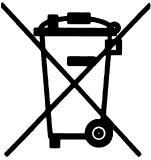Taking back waste batteries
Consumers are required by law to return all waste batteries to either a store or another collection point for waste batteries. Waste batteries should never be placed in the household garbage, or anywhere in the environment. This is indicated by the symbol comprising a crossed-out wheeled bin that appears on batteries and/or battery packaging. In the interest of facilitating waste battery collection, manufacturers of portable batteries have established a joint collection known as the Gemeinsames Rücknahmesystem GRS Batterien (known as Stiftung Gemeinsames Rücknahmesystem Batterien).
Retailers are required by law to take back waste batteries free of charge. In Germany, collection boxes in which consumers can deposit waste portable batteries are available at all stores that sell portable batteries, e.g. supermarket, discounter, drugstore or construction market. Some municipalities take waste batteries back, e.g. via vehicles that make regular collections of hazardous waste, or recycling centres.
Restrictions on the use of heavy metals
The Batteries Act (BattG) sets the following limits on mercury content in batteries: button cells may contain up to 2 percent (20 grams per kilogram) of mercury, while the limit for all other types of batteries is 0.005 percent (5 milligrams per kilogram). Portable-battery cadmium content is limited to 0.002 percent (20 milligrams per kilogram). Batteries used for cordless power tools, emergency or alarm systems emergency lighting, and medical devices are exempt from this limit.
For batteries whose mercury, cadmium or lead content exceeds specific limit values, this fact must be indicated on the battery or packaging, below the symbol of the crossed-out whelled bin.
WEEE-Reg.-Nr. DE 57995938
